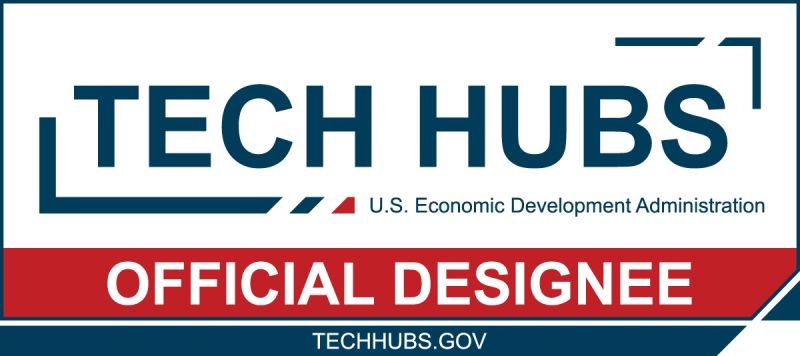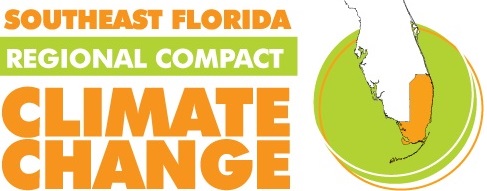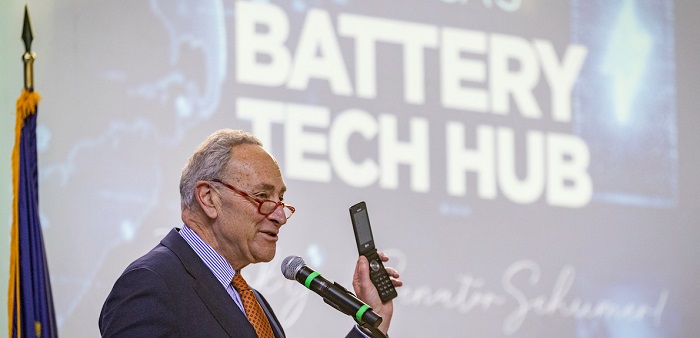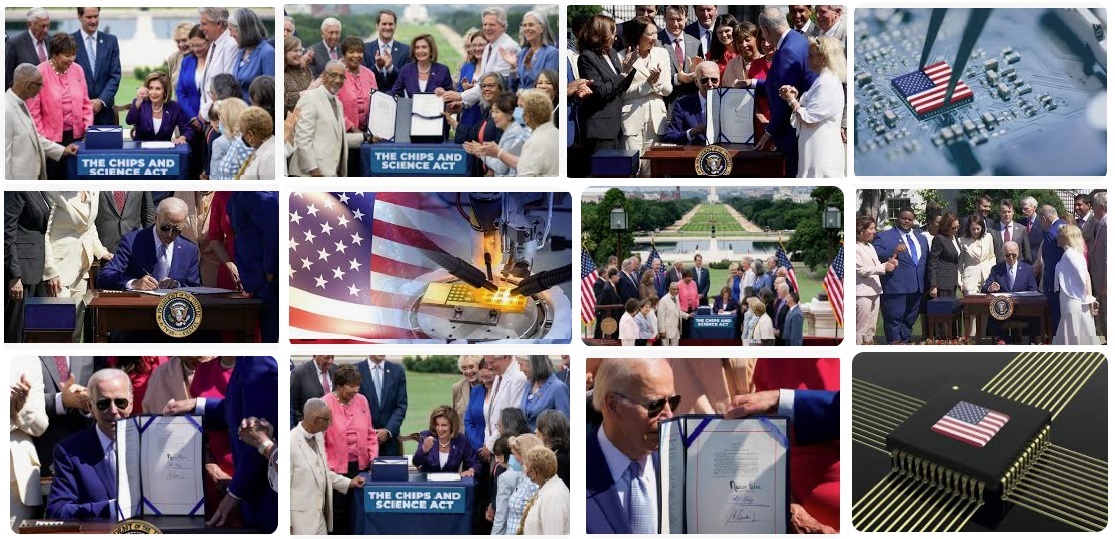16 min read
The CHIPS & Science Act is a federal statute enacted by the US Congress and signed into law by President Joseph R. Biden on August 9, 2022. The Act designates roughly $106 billion in various types of funding, both direct sponsorship and tax breaks in the hopes of encouraging American companies to build new silicon chip manufacturing plants in the United States. There’s lots of funding for advanced semiconductor research and development, some of which will go to the National Science Foundation to stimulate education and thereby resolve short-term labor supply issues.
The US government collected over four-hundred applications from across America, and in October 2023, the Biden-Harris Administration recognized and funded 31 regional Tech Hubs to spur innovation, strengthen manufacturing, and create good paying jobs. These 31 Tech Hubs have already received some funding and now compete for even more benefits in Phase 2 of the program. The Tech Hubs span thirty-two states and Puerto Rico and experts believe fostering their growth will help propel American innovation in chip manufacturing and other related industries.
What is a Tech Hub?
 Clustered around major American universities and research institutes are communities of high tech businesses which thrive because of their close association and the way they share new ideas and conspire to create innovative assembly processes.
Clustered around major American universities and research institutes are communities of high tech businesses which thrive because of their close association and the way they share new ideas and conspire to create innovative assembly processes.
Earning an official Tech Hubs designation from the US government is a strong endorsement of an economic region’s plan to supercharge a critical technological ecosystem and become a global leader over time.
Tech Hubs Designees as they’re officially called, have already received grant money and most have since applied for the Tech Hubs Phase 2 Notice of Funding Opportunity (the deadline was 29 February 2024). Those applications are in, and now we’re waiting for subsequent announcements to tell us which Tech Hubs will receive the Phase 2 Implementation Award through the U.S. Economic Development Administration.
What are the 31 Tech Hubs?
Here are the locations and the official names of the Tech Hubs in these regions.
- 1. Buffalo, Rochester, Syracuse, NY: NY SMART I-Corridor Tech Hub
- 2. Tulsa, Oklahoma: Tulsa Innovation Labs
- 3. Rhode Island and Massachusetts, Ocean Tech Hub
- 4. Montana: Headwaters Hub – Accelerate Montana
- 5. Denver, Colorado: Denver Tech Center
- 6. Chicago, Illinois: 1871 Chicago
- 7. Richmond, Virginia: Virginia Tech Corporate Research Center
- 8. New Hampshire: New Hampshire Tech Alliance
- 9. University of Illinois: Research Park at the University of Illinois Urbana-Champaign
- 10. Kansas City: KC Tech Council
- 12. Bloomington Indiana: The Mill
- 13. Puerto Rico: Parallel18
- 14. Milwaukee Wisconsin: Milwaukee Tech Hub Coalition
- 15. Birmingham, Alabama: Innovation Depot
- 16. Philadelphia, Pennsylvania: University City Science Center
- 17. St. Paul, Minnesota: MSP Tech Hub
- 18. Louisiana: Nexus Louisiana
- 19. Boise, Idaho: Trailhead Boise
- 20. South Carolina and Georgia: SC Launch Inc. (South Carolina) and ATDC (Georgia)
- 21. Miami, Florida: eMerge Americas
- 22. Birmingham, New York: Birmingham Tech Hub
- 23. Nevada: Nevada Center for Applied Research
- 24. Missouri: Cortex Innovation Community (St. Louis) and UMKC Innovation Center (Kansas City)
- 25. Texas: Capital Factory (Austin)
- 26. Oregon: Oregon Bioscience Incubator
- 27. Vermont: Vermont Center for Emerging Technologies
- 28. Akron, Ohio: Bounce Innovation Hub
- 29. Maine: Maine Center for Entrepreneurs
- 30. Washington: CoMotion Labs (University of Washington)
- 31. Baltimore, Maryland: ETC (Emerging Technology Centers)
The cities and names reflect the official or commonly recognized designations of Tech Hubs in these locations. Let’s look at some of them in more detail.
-
1. NY SMART I-Corridor Tech Hub – Buffalo, Rochester, Syracuse
After securing the Tech Hub designation for Buffalo, Rochester, Syracuse, the New York Semiconductor Manufacturing and Research Technology Innovation Corridor Consortium (NY SMART I-Corridor), U.S. Senate Majority Leader Chuck Schumer then announced the coalition has officially submitted its application for up to $54 million in additional funding as per the Phase 2 Implementation funding. KPDI Blog has already examined this nearby tech cluster and why it’s perfectly positioned to be the most successful Tech Hub. 
Why is Buffalo NY the fastest growing Tech Hub in the United States?
Buffalo has a skilled workforce in a handy location with plenty of room to expand. It’s an increasingly important commercial center and is growing faster than Boston, and the Bay Area, San Francisco, and every other Tech Hub in the United States.
-
2. Tulsa, Oklahoma: Tulsa Innovation Labs
Tulsa Hub for Equitable & Trustworthy Autonomy (THETA), led by Tulsa Innovation Labs, aims to become a global leader in developing and commercializing autonomous systems for use cases ranging from agriculture and pipeline inspections to regional transportation.

Leveraging the Greater Tulsa Region’s university-based research institutes in aircraft systems (UAS) and cybersecurity technologies. The Skyway Range flight corridor testing facility is core to their pitch. The THETA Tech Hub will develop and innovate autonomous systems applications while increasing their security and integrity and everything manufactured here will bear the moniker, ‘Tested and Made in Tulsa, USA.’
-
3. Rhode Island and Maryland have an Ocean Tech Hub
Ocean Tech Hub (RI, MA), led by the Rhode Island Commerce Corporation, aims to develop, test, and commercialize emerging maritime artificial intelligence and machine learning-enabled robotics and sensors. It coalesces the decades-long investment, research and innovation in marine automation.
The Ocean Tech Hub will test and utilize advanced materials, including composites, and catalyze a rapid technology transfer and commercialization specialty in the ocean technology field. Data collection informs computer simulations which advance machine learning. OTH’s mandate is to develop a world-leading hub for undersea robotics and sensors which will be used to support national security and business.
4. Montana – Headwaters Hub
Headwaters Hub is led by Accelerate Montana and aims to be a global leader in smart technologies for automating complex processes, such as industrial manufacturing.

They plan to build onto Montana’s existing strength in smart optical sensing technologies and expand their capabilities into autonomous systems, national defense, precision agriculture, and critical resource management. The key focus of this Tech Hub is to rapidly scale the commercialization and industry applications of smart photonic sensing systems which can be applied to national security and disaster prevention applications.
5. Denver Colorado – Elevate Quantum
Elevate Quantum in Colorado aims to solidify the region’s global leadership in quantum information system technology (QIST) to increase infrastructure resilience and strengthen the quantum hardware supply chain. It’s a public-private consortium with more than seventy member organizations. This collective works to ensure Colorado and the Mountain West region in general retains its role as national and international leader in quantum technologies and quantum information science.

Colorado’s scientists have already earned four Nobel Prizes for their work on quantum science since 2000, and so the region is already home to a plethora of quantum science related organizations. There are already more QIST (Quantum Information Systems and Technology) jobs here than anywhere else in the country.
6. Chicago, Illinois – Bloch Tech Hub
Bloch Tech Hub is led by the Chicago Quantum Exchange (CQE) which is already a leader in quantum computing, communications, and something called QIST – The idea is to use quantum computing to enable new solutions for other sectors including finance and fraud protection specifically, energy delivery and manufacturing, and biotechnology advances which includes using Artificial Intelligence to promote the discovery of new medicines.
-
7. Richmond, Virginia
Advanced Pharmaceutical Manufacturing Tech Hub (VA), led by the Commonwealth Center for Advanced Manufacturing in Richmond Virginia aims to help secure the medical drug industry from foreign disruptions. Like many other things, overseas pharmaceutical development now causes supply chain vulnerabilities in addition to making regulation and monitoring more difficult. The solution is bring the drug makers home again and this funding accelerates the growth, innovation, and sustainability of the U.S.-based Advanced Pharmaceutical Manufacturing industry to re-shore safe and affordable medicines through innovation and continuous-flow manufacturing technologies.

Virginia’s Gateway (VGR) region is a recognized advanced drug hub. It’s a transformational pharmaceutical manufacturing cluster which is already important in our post-COVID world. The Virginia delegation which includes two senators, business leaders and high profile researchers is now pushing for Phase 2 funding and an implementation award from the EDA which would help them secure tens of millions in additional federal funding.
-
8. New Hampshire
ReGen Valley Tech Hub is found in Nashua and Manchester New Hampshire, and is led by the Advanced Regenerative Manufacturing Institute (ARMI). The cluster aims to make New Hampshire a global leader in biofabrication to produce cost-effective regenerative therapies which address chronic disease and organ failure.
-
9. Illinois
iFAB Tech Hub (IL), led by the University of Illinois Urbana-Champaign, aim to scale precision fermentation to convert underutilized corn feedstocks into high-value, customized alternative proteins, food ingredients, materials, chemicals, and more
Illinois has abundant corn and soy feedstocks, and food processing infrastructure. The funding will be used to attract research leadership, and this Tech Hub hopes to become a domestic biomanufacturing testbed through the development and deployment of multi-use pilot and demonstration capacity. They hope to develop the necessary equipment for efficient biomanufacturers, while training a skilled workforce in this exciting field.
10. Kansas City
The KCBioHub includes dozens of partner organizations, including Kansas State University, the University of Kansas, the University of Missouri, the University of Missouri-Kansas City and several two-year and community colleges in the area. This hub will focus on innovations in animal and human vaccine development and manufacturing.

Kansas City Inclusive Biologics and Biomanufacturing Tech Hub (MO, KS), led by BioNexus KC, aims to position eastern Kansas and western Missouri as a global leader in biologics and biomanufacturing, increasing domestic production of life-saving vaccines and other preventative technologies.
11. Indiana
Heartland BioWorks (IN), led by the Applied Research Institute, aims to develop central Indiana into a global leader in biotechnology and grow a biomanufacturing business cluster with an eye on increasing America’s capacity to make and deploy life-saving medicines.
-
12. Puerto Rico
PRBio Tech Hub (PR), led by the Puerto Rico Science, Technology and Research Trust advances biotechnology research through fast-tracking the discovery, development, manufacturing, and supply of next generation biotechnology and medical device products to detect, treat, and cure diseases and ailments.
-
13. Milwaukee, Wisconsin
Wisconsin Biohealth Tech Hub (WI), led by BioForward Wisconsin, aims to position Wisconsin as a global leader in personalized medicine, an emerging healthcare approach that tailors tests, treatments, and therapies informed by a patient’s unique genetic code, medical record, and environment.
-
14. Birmingham, Alabama
Birmingham Biotechnology Hub in Alabama is led by Southern Research Institute and aims to become a global leader in drug and vaccine development by applying artificial intelligence-driven biotechnology to increase representation in clinical genomic data and clinical trials.
-
15. Philadelphia, Pennsylvania
Greater Philadelphia Region Precision Medicine Tech Hub is based in four states, Pennsylvania, Delaware, Maryland and New Jersey. This collective is led by the Ben Franklin Technology Partners of Southeastern PA and aims to become a global leader in end-to-end precision medicine, and develop their region’s life sciences resources, research and development expertise, and clinical trials in areas that include cell and gene therapy, medical devices, artificial intelligence and robots, 3-D printing, nanotechnology, vaccines, and biomanufacturing.
-
16. St Paul, Minnesota
Minnesota MedTech Hub 3.0 is led by the Minneapolis Saint Paul Economic Development Partnership and hopes to position Minnesota as a global center for “Smart MedTech” by integrating artificial intelligence, machine learning, and data science into medical technology.
-
17. Louisiana – GLOW Propeller
Gulf Louisiana Offshore Wind or GLOW Propeller is led by Louisiana State University with a mandate to transition Louisiana’s energy economy from its legacy of oil and gas to wind and renewable energy.

The GLOW Propeller consortium brings together public and private partners, including five universities (LSU, Southern, Tulane, UNO and Xavier), two community colleges (Delgado and Nunez), industry (Gulf Wind Technology, RWE and Sev1Tech), as well as Greater New Orleans, Inc., the Water Institute of the Gulf, Louisiana Economic Development, Louisiana Department of Natural Resources, City of New Orleans and Port Fourchon, which is America’s leading offshore energy port, located in Lafourche Parish.
-
18. Idaho and Wyoming
- West Nuclear Energy Tech Hub is led by the Idaho Advanced Energy Consortium and aims to position Idaho and Wyoming as a global leader in small modular reactors (SMR) and advanced nuclear energy to contribute to a clean energy future.
-
19. South Carolina and Georgia
SC Nexus for Advanced Resilient Energy is led by the South Carolina Department of Commerce and aims to be a global leader in advanced energy by developing, testing, and deploying exportable technology, which means they hope to develop new businesses and knowledge they can sell.
It’s believed SC Nexus will contribute to America’s economic and national security by expanding the availability of grid resilience technologies (GRT) and by enabling the greater deployment of distributed energy resources (DERs) which will fortify energy supplies, promote decarbonization, and reduce grid disruptions.
-
20. Miami, Florida – Climate Resilience
South Florida Climate Resilience Tech Hub is led by the Miami Dade County Innovation and Economic Development Office and aims to advance its global leadership in Sustainable and Resilient Infrastructure (SRI) solutions for the global climate crisis.

With an eye towards securing Florida’s coastal and marine infrastructure by developing a cluster of clean cement and energy efficiency building industries, and by fostering research institutions, this Tech Hub will jumpstart SRI innovation by developing, commercializing, and scaling SRI technologies, focused on climate adaptation and mitigation.
-
21. Birmingham NY – Battery Tech Hub
Birmingham’s New York Battery Tech Hub is led by the State University of New York (SUNY) and aims to bolstering battery technology and manufacturing across the entire value chain.

Batteries will form the cornerstone of a low carbon economy, whether in cars, aircraft, consumer electronics or grid storage, Birmingham’s advanced battery tech R&D will be invaluable to America’s green revolution.
-
22. Nevada
Nevada Lithium Batteries and Other EV Material Loop (NV), led by the University of Nevada, Reno, aims to build a self-sustaining and globally competitive full lithium lifecycle cluster, spanning extraction, processing, manufacturing, and recycling.
-
23. Missouri
Critical Minerals and Materials for Advanced Energy (CM2AE) Tech Hub (MO), led by the University of Missouri System, aims to position south-central Missouri as a global leader in critical minerals processing to provide the materials needed to support battery technology.
-
24. Texas and Oklahoma – Southern Methodist University
Texoma Semiconductor Tech Hub is led by Southern Methodist University and aims to unify existing and planned semiconductor supply chain infrastructure. They hope to do this by enhancing regional collaboration and uplifting underserved communities through workforce expansion – more specifically, through the geographic distribution of Fablets™. Fablets are shared labs which can provide infrastructure for research, prototyping, training, and commercialization. By distributing these facilities throughout the area they hope to grow a reliable workforce in twenty-nine counties in the Texoma region of North Texas / Southern Oklahoma.
-
25. Oregon State University – Corvallis Microfluidics Tech Hub
Corvallis Microfluidics Tech Hub is led by Oregon State University and aims to establish global leadership in the development, scaling, and commercialization of microfluidics technology for use in semiconductor and electronic cooling.
-
26. University of Vermont – Gallium Nitride Tech Hub
The Gallium Nitride Tech Hub at the University of Vermont aims to improve and standardize Gallium Nitride manufacturing technology for wireless communication. V-GaN Tech Hub will build on Vermont’s culture of innovation by driving opportunities in education, research, and commerce.
The funding will be used, in part, to modernize GlobalFoundries 200mm facility in Essex Junction, Vermont, creating the first US facility capable of high-volume manufacturing of next-generation GaN semiconductors. This is expected to spur vital workforce expansion across the region. V-GaN Tech Hub will build on Vermont’s culture of innovation by driving opportunities in education, research, and commerce which will lead to the development and commercialization of GaN Devices and spur vital workforce expansion across our region.
A bandgap measurement relates to how well a solid material conducts electricity. Gallium nitride has a 3.4 eV bandgap, compared to silicon’s 1.12 eV bandgap. Gallium nitride’s wider band gap means it can sustain higher voltages and higher temperatures than silicon-based systems. This wider bandgap enables gallium nitride to be applied to optoelectronic high-power and high-frequency devices which are in demand today and will be critical in the near future.
-
27. Akron Ohio – Sustainable Polymers Tech Hub
Sustainable Polymers Tech Hub is led by the Greater Akron Chamber and aims to tackle climate change and mitigate the impact of fossil fuel-derived polymers (rubbers and plastics) on the environment through accelerating sustainable polymer manufacturing and commercialization in the United States.
Akron Ohio was once the rubber capital of the world and now harbors tech accelerators including Bounce Innovation Hub. Founded in January 2018, Bounce is a model of efficiency and serves entrepreneurs, startups and small businesses from its headquarters in downtown Akron, Ohio. The nonprofit organization has a building which measures in excess of 300,000 square feet wherein they allow co-working, host events and meetings and rent professional office space. With more than fifty community-minded organizations in their building, Bounce hosts more than 250 people working and creating a better future for Ohioians.
-
28. Maine – Forest Bioproducts
Forest Bioproducts Advanced Manufacturing Tech Hub is led by the Maine Technology Institute and aims to be a global leader in forest-based biomaterial production and manufacturing. They received funding for their work innovating the process of extracting biological ‘building blocks’, and to manufacture environmentally sustainable products. The projects on the menu for development will benefit the entire region, and the consortium is committed to fostering growth in a forest supply chain, with an eye towards benefitting disadvantaged and historically under-served populations.
-
29. Washington (State)
American Aerospace Materials Manufacturing Tech Hub is led by Gonzaga University which aims to research and develop new domestic supply chains to meet the immediate demand for high-rate production of advanced composite materials for both military and commercial markets.
-
30. Oregon Washington
Pacific Northwest Mass Timber Tech Hub is led by Oregon State University and aims to be a global leader in mass timber design and manufacturing to lower the construction industry’s carbon footprint and improve housing affordability.
-
31. Baltimore Tech Hub
Baltimore Tech Hub is led by the Greater Baltimore Committee and aspires to develop predictive healthcare technology by applying artificial intelligence to biotechnologies. The search for advanced medicines can be stimulated by AI research and the Baltimore Tech Hub represents a consortium of 38 business and technology leaders in the health sector.
